Student Voice
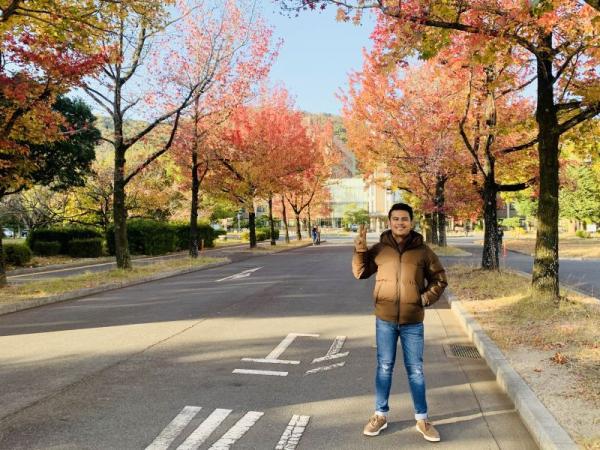
Leo Peter Dacumos
Nationality
Philippines
University/Institution Name
Okayama University
Department/Faculty
Graduate School of Education
Period of study abroad
1 years 6 months
What did you do before studying in Japan?
High School Science and Research Teacher
Why did you choose to study in Japan?
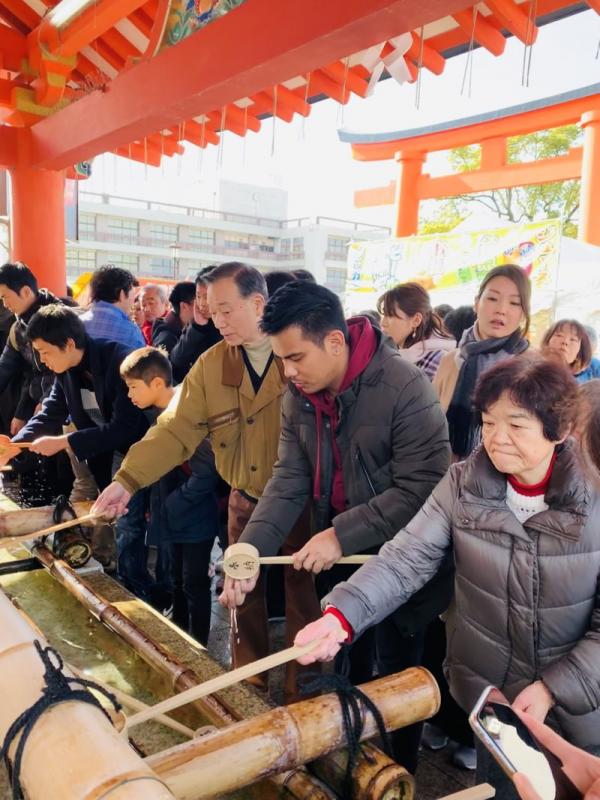 There are plenty of reasons why Japan is my number one choice to pursue my continued professional development as a young professional teacher in my home country, the Philippines. Amongst them are:
There are plenty of reasons why Japan is my number one choice to pursue my continued professional development as a young professional teacher in my home country, the Philippines. Amongst them are:
1. Japan has strong regard to Science, Technology, Engineering, and Mathematics (STEM), and such sense has led this country to be amongst the forefronts of innovation and modernization in the world. Japan’s formidable high standards in education, including its commitment to research and development, stands behind such excellence. This has also resulted in Japan’s consistently high performance in international assessments, particularly in the field of Sciences and Mathematics, and their superior literacy in these fields. Being a science educator, I am fascinated by such high respect for science and mathematics education - an appealing reason to continue my professional growth here, and be part of a system that exudes academic excellence. Japanese institutions layout a high calibre framework for STEM education, and prepare students in this technological world. Thus, graduating from these institutions can open many opportunities for STEM professionals, as students are trained and achieve a level of exponential growth, making them glocally and globally competitive. Japan’s continuing priority in education makes the country an accommodating and safe hub not only for Japanese students but as well as for international students.
2. Japan boasts a rich and flourished culture amidst the level of advancement that the country experiences. It is known to be one of the best destinations for cultural exchanges because of its enriched cultural foundation. Living and studying in Japan showcases, not only a flash of a new culture but an unforgettable experience to learn it through their food, historical sites, museums, amongst others while simultaneously learning Japan's technological successes. Japan's has successfully proved the world that a shift to modernization does not compromise the preservation of culture and tradition. Hence, regardless of my major and my career path, studying in Japan can afford me with opportunities that are of personal and professional value.
3. Japan remains as the safest country in the world with a remarkably low crime rate. Japan is amongst the lowest numbers of violent crimes worldwide, even amongst the lowest regarding lesser crimes such as theft. Furthermore, Japan has one of the best and most advanced healthcare systems worldwide, not to mention its accessibility to low-income earning family and foreign residences. Hence, while receiving a competitive education, living in Japan will allow me to feel comfortable with my safety and health.
How did you prepare for studying in Japan? Please tell us about how you found the information on institutions, supervisor, scholarship, and others.
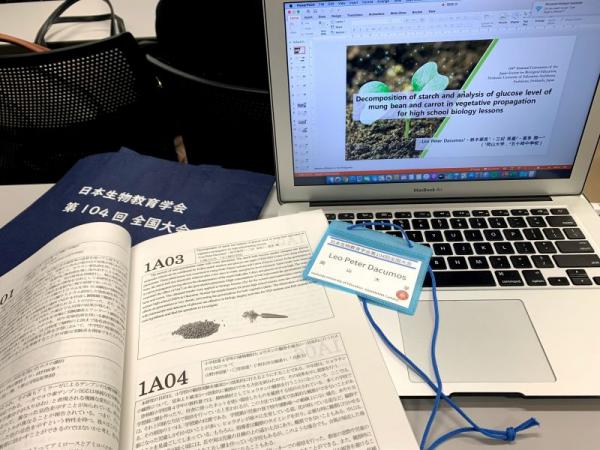 Japan Information and Culture Center (JICC), the cultural and public arm of the Japanese Embassy in the Philippines, provided a wide range of information and educational services, including scholarship information, that are available in several social networking platforms such as Facebook. This information allowed me to be informed of the possible opportunity to seek for the appropriate program and a scholarship grant for me. So, as I decided to go for the MEXT Teacher Training Program, I prepared all the needed requirements such as the Application Form, Placement Preference Application Form, Certified Grade Transcript from University, University Diploma, Certificate of Employment, Recommendation Letter from Supervisor, and Medical Certificate.
Japan Information and Culture Center (JICC), the cultural and public arm of the Japanese Embassy in the Philippines, provided a wide range of information and educational services, including scholarship information, that are available in several social networking platforms such as Facebook. This information allowed me to be informed of the possible opportunity to seek for the appropriate program and a scholarship grant for me. So, as I decided to go for the MEXT Teacher Training Program, I prepared all the needed requirements such as the Application Form, Placement Preference Application Form, Certified Grade Transcript from University, University Diploma, Certificate of Employment, Recommendation Letter from Supervisor, and Medical Certificate.
The Application Form for me contains the most important reference for the selection to the program, i.e. Research Plan. The clarity of your research goals and objectives, the novelty of the research, its significance and benefits to people, amongst others can significantly impact the selection to the program you are interested in. So, I had to conceptualize a research plan that met all these criteria to stand out from the rest of the applicants and make a positive impression. A stellar grade transcript and recommendation letter were not enough since many of the other applicants were equally exceptional if not better; hence, the need for me to have a well-crafted research plan.
With hundreds of Universities in Japan that are at the cutting edge of education and research, it took me a while to peruse and select the best universities that fit the research plan I have conceptualized. The embassy provided a comprehensive list of Japan universities which included the names of professors, their specializations, and research interests. This allowed me to narrow down the universities to my top five universities of consideration. While this was not part of the procedure, I also read through the research achievements of these professors. This was another criterion I set for myself to select the university and professors who will best guide me through my research venture.
How is your student life in Japan? Please tell us about your study, research, part-time job, and others.
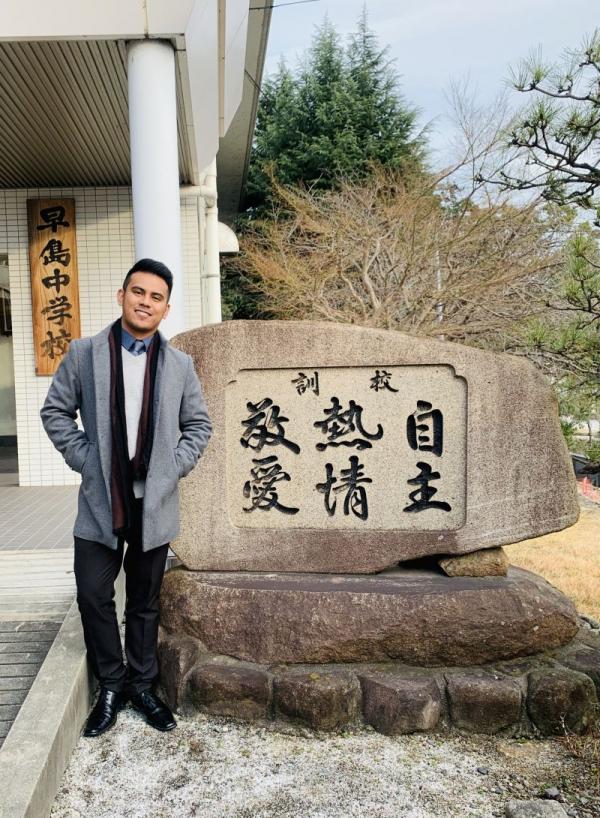 On adjusting to a new life and part-time job
On adjusting to a new life and part-time job
Studying abroad is not easy - it required me to, literally, shift my life to a new and unfamiliar country, and adjust to a new life and an unchartered every day. Such a move can be both worthwhile and tight, as it is for anyone in their student life. It is worthwhile because it gives me opportunities to be educated in highly-competitive university with an equally competitive professor, to meet new friends coming from diverse cultures, to visit places both cultural and highly-technological I have not been before, and to be immersed in a new culture. But at the same time, studying in Japan can be tough and challenging. Universities expect students to prioritize dedication to education hence the need for me to meet school demands, such as presentations, homework, quizzes, and examinations, competently, efficiently, and on time. But the feeling of accomplishing these school demands can be very rewarding, if not, gratifying.
Furthermore, another challenge that I had to adjust to is the cost of living. Japan has an extremely high cost of living, especially for someone coming from a country that has significantly lower prices. However, the Japanese government, even with my student visa, permits me, and all other students, to get a part-time job to have an extra source of funding which allows me to get through my everyday expenses, shopping, and travel! In fact, 75% of local and foreign university students get part-time jobs in Japan. I was lucky to have been recommended by my university to get a once-a-week part-time job as an Assistant Language Teacher (ALT) in one of the junior high schools in Okayama from January to March of 2020 - where I assisted English teachers in their language instruction and served as my own culture's ambassador.
Currently, I served as a new assistant research teacher for inquiry-based researches and projects for students in one of the senior high schools (designated Super Science High School) in Kurashiki, Okayama through the recommendation of my professor. This exposure enabled me to be engrossed and learned more on the student research practices and education methodologies and pedagogies of Japanese teachers. For a science teacher like me, this is a win-win situation, i.e. a part-time job on one hand and an extension of my teacher training on the other.
On research ventures
The very goal of my stay in Japan is the implementation of my research plan which I conceptualized in my application for this program. But before I even started with that, my professor, as a prolific researcher that he is, asked me to conduct a study on seed germination focusing on starch granule size and glucose level using an alternative reflection photometer that one of my laboratory mates prepared. Furthermore, the results of this experimentation were implemented as a classroom tool in one senior high school in Tsuyama, Okayama. The conduct of the lesson allowed me to complete this research study and was lucky enough to be able to present all results of my study in the 104th National Convention of the Japan Society for Biological Education held in Hokkaido, Japan in January 2020. This was an opportunity I never saw coming as I was only expecting to conduct and finish the research I conceptualized for this training. So being given the chance to conduct another research, implement it as a lesson, and present in a national convention is a chance of a lifetime. Hence, this strengthens my earlier claim the need to read through the profile and research achievements of your prospective professor.
As I write this article, I recently presented my conceptualized and polished research plan (which I originally wrote on my application form for this program) to my professors. My research aims to understand the scientific research and development curricula (including practices, methodologies, and strategies) of designated super science high schools in Japan and make a comparison to Philippine's STEM program through documentary analysis and survey administration. I am fortunate enough that my professor has a wide range of connections to the different schools around the prefecture which will allow me to realize the objectives of my study. So far, my research ventures, both finished and on-going, gave me new light in doing it with proper guidance, connections, and resources.
On making new friends
Life as an international student can often be challenging, demanding, and, at times, mind-boggling. Moving away from friends and family, fitting in into the middle of a new culture, and learning a new language is never easy. With Filipinos’ strong family ties in my system, homesickness is amongst my biggest struggles adjusting to this new environment, on top of the language barrier. But one thing that I find most useful to experience less culture shock, homesickness, and adjustment to a new overseas student life is finding new friends, who are feeling exactly the same. There are tons of students, both local and international, who are equally eager to make new friends. Okayama University even instituted a conversational cafe to meet new peers, explore the prefecture, learn other cultures and languages through interaction with students around the world.
Furthermore, my university residence has been an excellent hub for extending my network of friends. All I needed to do was to find those who share the same interests, hobbies, majors, and even craziness. But even those whom I felt I share little congruity, became part of my friendship circle. These are the people who helped (and continuously helping) me cope with academic pressure, and feeling of loneliness, homesickness, and boredom.
Studying in Japan has afforded me with international friends who helped me feel settled ? with jams in Karaoke, workouts in gyms, studying in cafes, eating out in restaurants, and endless conversations on the side. It only took me an open-mind and a piece of cordiality to find the best bunch of people who helps me adjust in my new life in Japan.
Any message and/or advice to those who wish to study in Japan?
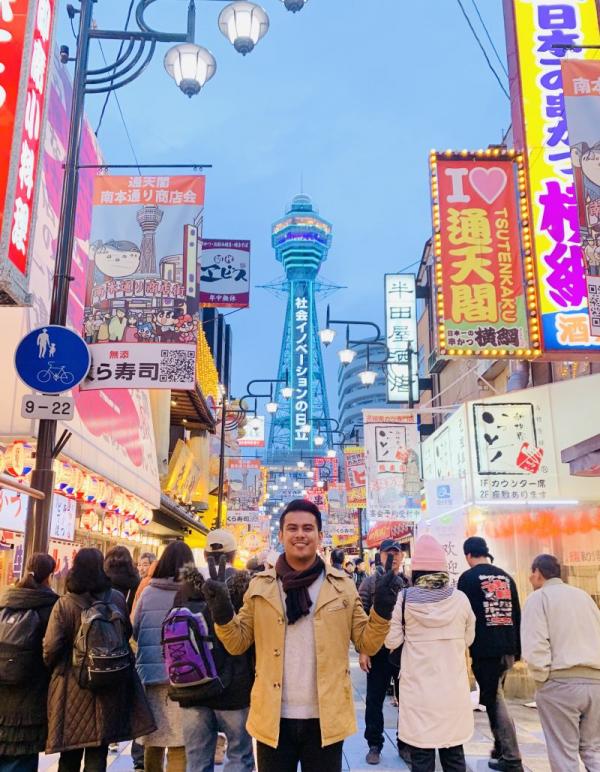 Studying in Japan, or anywhere overseas, is not merely a chance to be a long-term tourist. Your genuine interest to learn and study should come ahead of any other reasons. Hence, the motivation should arise from your eagerness to learn a significant amount of knowledge and skills from amongst the best universities in the world while enjoying the beauty of the country. Such motivation can get you through gruelling course works and requirements and adjustments to new life. Be ready, both physically and emotionally, as you are about to dive into a new adventure that requires not just your wit but also your strong mind and heart. The amount of academic pressure, feeling of loneliness, and even changes in seasons can easily trample your spirit and your body.
Studying in Japan, or anywhere overseas, is not merely a chance to be a long-term tourist. Your genuine interest to learn and study should come ahead of any other reasons. Hence, the motivation should arise from your eagerness to learn a significant amount of knowledge and skills from amongst the best universities in the world while enjoying the beauty of the country. Such motivation can get you through gruelling course works and requirements and adjustments to new life. Be ready, both physically and emotionally, as you are about to dive into a new adventure that requires not just your wit but also your strong mind and heart. The amount of academic pressure, feeling of loneliness, and even changes in seasons can easily trample your spirit and your body.
Furthermore, you must remember that a fully-conceptualized and robust research plan, a well-researched target University and professor, will be your strong points to landing to the program that you are interested in. This will also be your guiding compass throughout your Japanese university life, as soon as you become part of the new batch of incoming international students. Hence, when you know your direction, you will be led to the successful realization of your goals.
On the other hand, relax. While dedication to your study is your primary reason in coming to Japan, you need to release the tension at times and try to explore the place. Japan is the best place to find peace and serenity; hence, you are in for a treat studying in a country that offers you both comprehensive education and leisure. Many of Japan universities offer tours to experience Japanese Culture and exchanges with local schools. In some cases, you are even paid to do these!
While some programs require you to undergo an intensive Japanese language training before the program proper, in some cases, you start right away with the program. In such a case, learning the Japanese language can be very useful. This will let you deal with your daily activities living in Japan, like simple greetings, shopping, and eating in restaurants.
Learn to balance your work and life. Make new friends from an international student and social groups. They will be your support group to get you through the laborious academic tasks and feeling of desolation.
But most importantly, ENJOY! The real success of studying and living abroad is acquiring knowledge with joy.
My 1-day
7:00 wake-up
7:30 breakfast
8:10 go to university
8:30 arrive at university
8:40 start the class
11:30 lunch
12:30 go to the station
13:00 part-time job as Research Teacher at Amaki Senior High School (once a week)
18:00 finish the part-time job and eat dinner
18:30 go to the university laboratory
20:30 go to gym
22:00 meet with friends
23:00 go home and sleep
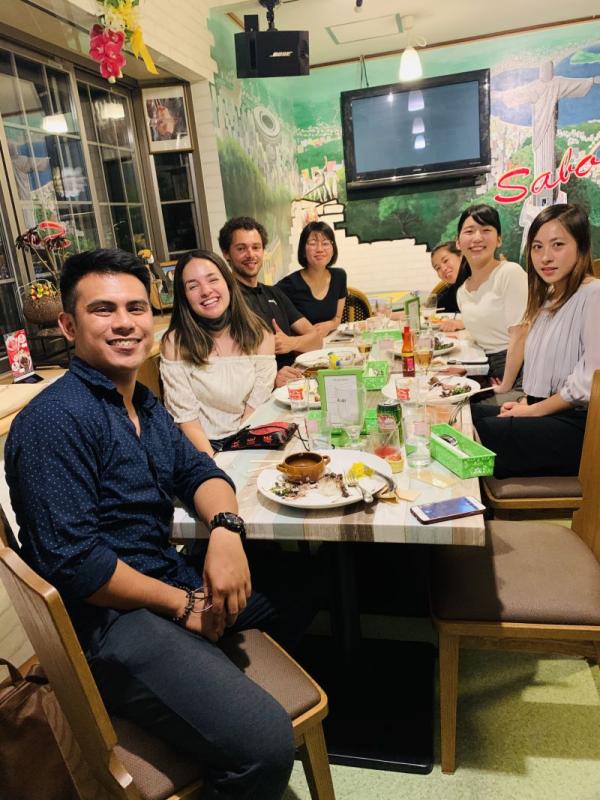


 There are plenty of reasons why Japan is my number one choice to pursue my continued professional development as a young professional teacher in my home country, the Philippines. Amongst them are:
There are plenty of reasons why Japan is my number one choice to pursue my continued professional development as a young professional teacher in my home country, the Philippines. Amongst them are: Japan Information and Culture Center (JICC), the cultural and public arm of the Japanese Embassy in the Philippines, provided a wide range of information and educational services, including scholarship information, that are available in several social networking platforms such as Facebook. This information allowed me to be informed of the possible opportunity to seek for the appropriate program and a scholarship grant for me. So, as I decided to go for the MEXT Teacher Training Program, I prepared all the needed requirements such as the Application Form, Placement Preference Application Form, Certified Grade Transcript from University, University Diploma, Certificate of Employment, Recommendation Letter from Supervisor, and Medical Certificate.
Japan Information and Culture Center (JICC), the cultural and public arm of the Japanese Embassy in the Philippines, provided a wide range of information and educational services, including scholarship information, that are available in several social networking platforms such as Facebook. This information allowed me to be informed of the possible opportunity to seek for the appropriate program and a scholarship grant for me. So, as I decided to go for the MEXT Teacher Training Program, I prepared all the needed requirements such as the Application Form, Placement Preference Application Form, Certified Grade Transcript from University, University Diploma, Certificate of Employment, Recommendation Letter from Supervisor, and Medical Certificate. On adjusting to a new life and part-time job
On adjusting to a new life and part-time job Studying in Japan, or anywhere overseas, is not merely a chance to be a long-term tourist. Your genuine interest to learn and study should come ahead of any other reasons. Hence, the motivation should arise from your eagerness to learn a significant amount of knowledge and skills from amongst the best universities in the world while enjoying the beauty of the country. Such motivation can get you through gruelling course works and requirements and adjustments to new life. Be ready, both physically and emotionally, as you are about to dive into a new adventure that requires not just your wit but also your strong mind and heart. The amount of academic pressure, feeling of loneliness, and even changes in seasons can easily trample your spirit and your body.
Studying in Japan, or anywhere overseas, is not merely a chance to be a long-term tourist. Your genuine interest to learn and study should come ahead of any other reasons. Hence, the motivation should arise from your eagerness to learn a significant amount of knowledge and skills from amongst the best universities in the world while enjoying the beauty of the country. Such motivation can get you through gruelling course works and requirements and adjustments to new life. Be ready, both physically and emotionally, as you are about to dive into a new adventure that requires not just your wit but also your strong mind and heart. The amount of academic pressure, feeling of loneliness, and even changes in seasons can easily trample your spirit and your body.